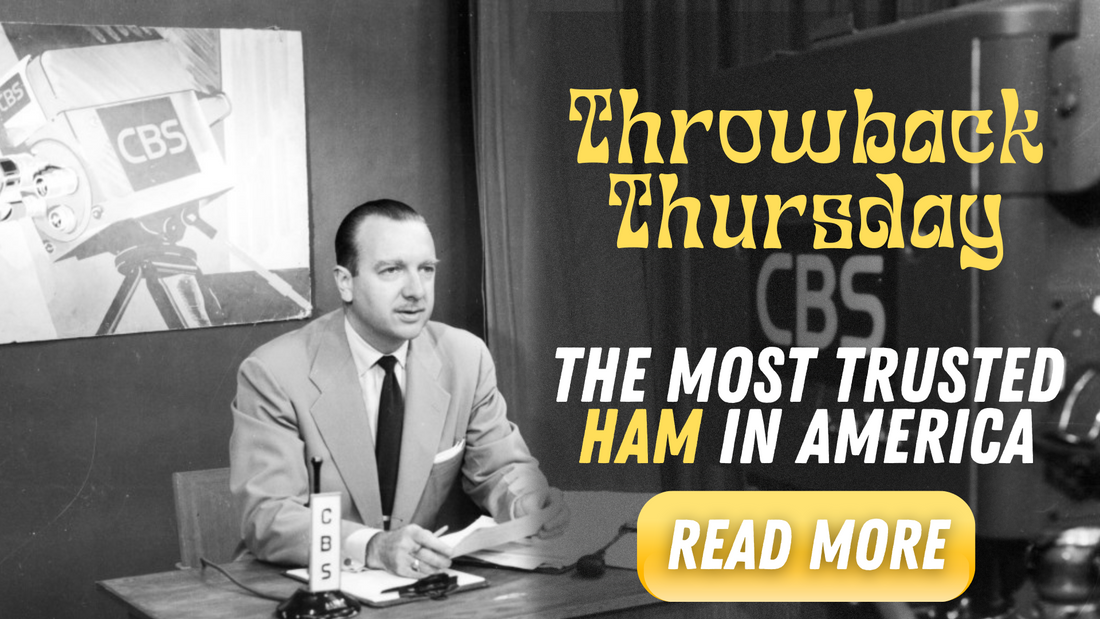
The Most Trusted Ham in America

Most know him as “the most trusted man in America,” but for us, Walter Cronkite, KB2GSD (SK) is one of the most famous ham radio operators - ever. Cronkite was the CBS Evening News anchor for nearly two decades and was known across the country for his legendary sign off, “And that’s the way it is.” Throughout his illustrious career, Cronkite earned many awards including the Presidential Medal of Freedom, a Peabody Award and an Emmy.
Personal Life and Career
Walter Cronkite was born on November 4, 1916 in St. Joseph, Missouri - less than 1 hour away from Smithville, MO, the home of BridgeCom Systems. His family later moved to Texas where he spent the majority of his childhood. His passion for journalism and reporting started as a young boy after reading an article in Boys Life. In 1933 Cronkite enrolled at the University of Texas at Austin to study political science, economics and journalism. He would end up leaving school to take a part-time position at the Houston Post. He never graduated from college.
Cronkite’s career took off during his time at Scripps Howard and the United Press. He served as a correspondent for the United Press during World War II and after the war was the Chief Correspondent for the Nuremberg trials. In 1950 Cronkite joined CBS News as a Washington correspondent and in 1962 he was named anchor of CBS Evening News. The defining moment that took Cronkite from CBS Evening News anchor to an American household name was his announcement of President John F. Kennedy’s assasination. Over the 19 years behind the CBS Evening News desk, Walter Cronkite was the steady voice Americans trusted to inform them on major events such as the moon landing, Watergate and the assassinations of Dr. Martin Luther King Jr. and John Lennon (of the Beatles, who Cronkite introduced to Americans in 1963).
In 1981, Walter Cronkite announced that he would be retiring at the age of 65 after almost 20 years as the anchor of CBS Evening News. On March 6, 1981 he anchored his final newscast ending with this: “Old anchormen, you see, don't fade away, they just keep coming back for more. And that's the way it is.”
Amateur Radio Career
For many years, Cronkite’s radio engineer at CBS was Steve Mendelsohn, W2ML. Mendelsohn told ARRL that over the years he had several opportunities to discuss the hobby of amateur radio with Walter and that his interest gradually increased. Even though Cronkite had purchased a receiver and would listen on the bands every now and then, he declined to take the licensing test due to the difficulty of the Morse Code portion of the test.
One day in the studio before their nightly broadcast, Mendelsohn needed to test the tone of the audio recorders. Knowing that Dick Muller, the CBS Evening News Director, was a Ham as well (WA2DOS), Mendelsohn grabbed a copy of the New York Times and sent Morse Code with the tone key for 10 minutes. After the broadcast that night, Cronkite walked into the control room and presented his script to Mendelsohn and Muller. On the back of the script was the entire text sent via Morse Code before the broadcast. The two Hams looked at the copy of the code, looked at each other and told Cronkite he had just passed the Morse Code test. Cronkite laughed and asked when the formal test was, only for Mendelsohn to remind him that it required two general classes to validate the test and he had formally passed the code test.
Weeks later Cronkite took and passed the written test and the most trusted man in America was officially a licensed amateur radio operator with the callsign KB2GSD. His first QSO was on 10 meters at about 28.390 MHz. Following his introduction on the air, his contact from the Midwest told him that that was the worst Walter Cronkite impersonation he had ever heard. Mendelsohn was on the air with Walter for that first QSO and the two laughed about the encounter for weeks.
Walter Cronkite passed away on July 17, 2009 at the age of 92. In 2007, two years before his death, Cronkite received the Radio Club of America’s most prestigious recognition, the Armstrong Award. Cronkite also received the ARRL President’s Award in 2007. Both awards recognize amateur radio operators who have made significant contributions in the amateur radio industry and community.

*Information on Walter Cronkite’s amateur radio experience found courtesy of ARRL







2 comments
Cronkite was and still holds 1 st place as being the best and most caring broadcaster on TV!
When he passed, I sent CBS HQ a QSL card with the comment that “the world will never again be the way it was”.
His signal report was 59+++ — coming from our local CBS TV station.